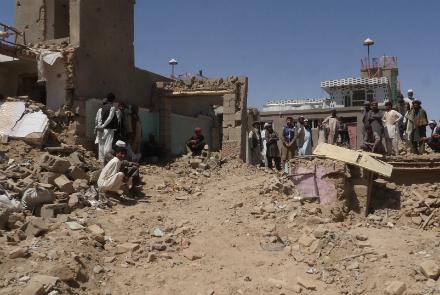A study by TOLOnews found that government’s spokespersons and some officials often disseminate incorrect information to the media – especially in security related incidents.
Among recent examples are the Taliban’s siege on Ghazni, the control of Bagram Prison and some security incidents in Kabul.
One example was of the rocket attack during an Eid al-Adha ceremony at the Presidential Palace this month. Insurgents fired at least 30 rockets that landed in areas around ARG – the Presidential Palace. Security agencies however gave out conflicting information at the time.
On the day of the attack, the Ministry of Interior said two attackers were involved and that they fired 11 rockets.
“Probably two terrorists were positioned at a compound named Sarai Maahi in PD1. They fired rockets on parts of Kabul which had no fatalities except two people sustained minor injuries,” Interior Ministry spokesman Najib Danish said on the day of the rocket attack - August 21.
Later in the day, Resolute Support Mission said in a statement nine insurgents had been involved in the attack and at least 30 mortar rounds had been fired at areas around the Presidential Palace.
In another instance of contradictory reporting by government was in the case of Sherkhan Farnood’s death. The founder and former head of the old Kabul Bank died on Friday in Bagram Prison. On Saturday, Mohammad Radmanish, spokesman for the Ministry of Defense, said the ministry controls the outer perimeter of Bagram prison and that it is not involved in its internal affairs. He made the remarks after complaints were raised over conditions for prisoners at the Bagram Prison in Parwan province – almost 100 kilometers to the north of Kabul.
“We only support the outer environment of the (Bagram) prison; the internal affairs of the prison belong to other departments,” Radmanish said.
However, on Sunday, the Afghan Army Chief of Staff Gen. Mohammad Sharif Yaftali said the Afghan National Army controls the prison and that the jail personnel are closely watched by investigative and intelligence departments. He said there is no problem in the prison.
“Bagram Prison is run by the Ministry of Defense,” said Yaftali – which was in total contradiction to what Radmanish said a day earlier.
Meanwhile, Mujib Khalwatgar, CEO of Nai, an organization supporting open media in the country, said the lack of access to accurate information was a major challenge for the media.
“First, these officials have nothing to say; second, they are playing with people’s thoughts, and third they think that people are not hearing the explosions and do not count them,” Khalwatgar said in reference to Kabul residents having counted far more than government’s toll of 11 rockets last Tuesday.
Another example was the siege of Ghazni earlier this month. Again conflicting reports were provided by government officials.
Addressing a press conference on Ghazni siege on August 11, the Defense Minister Tariq Shah Bahrami gave an exact number of Taliban casualties but did not provide information about fatalities among government forces or civilians during the Ghazni City attack.
“We do not have an exact figure, but around 100 security and defense forces might have been killed and around 20 to 30 civilians might have lost their lives,” said Bahrami at the time.
President Ashraf Ghani visited Ghazni City after the Taliban siege where he said he had not received necessary information on the Ghazni situation until almost three days after the attack.
“Phone connections were disconnected. We did not have exact information for three days and it (the delay in getting information) was the main reason,” said Ghani on August 17.
Analysts said hiding information from the nation will affect people’s trust in government.
“In most cases, they hide information (from media and people). This has pushed the people not to believe in what government says,” said Ahmad Saeedi, an analyst.
“Hiding information (from the people) is a clear violation of the law. It shows a lack of coordination between government offices,” said Farida Nikzad, head of the Center for the Protection of Afghan Women Journalists.
Yet government’s stance is that any official who acts in contravention of the law on access to information will be subjected to prosecution.


